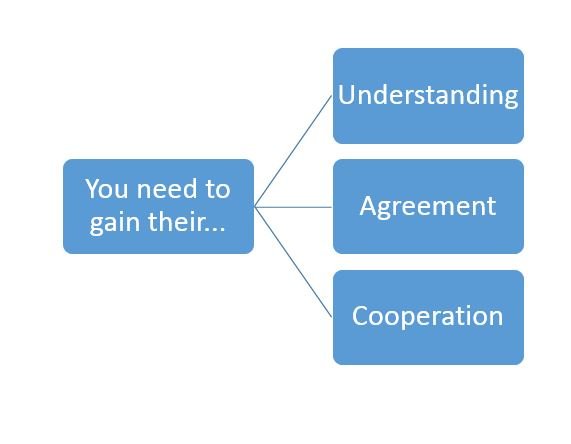Gain Their Understanding and Agreement
Gain Their Understanding and Agreement
You would benefit if you were to improve your communication skills.
Communication is important because you need to gain the understanding, agreement and active cooperation of others.
If people don't understand you, or if they don't agree with you, or if they don't cooperate with you, then you will find your progress is strictly limited.
We can break communication skills into three sets.
- Make your message understood.
- Gain their agreement.
- Gain their active cooperation.

Let us say a few words on how to achieve each of these goals.
1. How to make your message understood.
To make your message understood, you need to reduce your message to a single headline sentence. A single sentence that holds the essence of your meaning. If you can reduce your meaning to a single sentence; one that holds your main point, then you have made a "mental hook" in the mind of your listener, onto which you can hang all your subsequent ideas and information.
Without such a hook, your information and ideas will float into the mind of your listener, through one ear, and then it will float right out the other ear.
Always have a clear idea of what your main message is.
Always strive to be able to sum up your idea in a nutshell.
Being always able to sum up your message in a nutshell, will allow you to organise your content around it, so that your listener will be able to understand what you think is true.
Your first job as a communicator is to clearly state what you think is right, good and true.
Then you move to step two.
2. Gain their agreement.
The fact that the other person understands your message does not mean they agree with it.
You could understand someone's message, but be completely opposed to it.
The second communication skill is to make your message convincing.
You can make your message convincing only by offering proof or reasoning.
You need to be able to show WHY, what you are saying is right, good and true.
You can do that by using the following four methods.
- You can appeal to facts and figures. (Example: "According to research done by NHS, about 100,000 people in the UK die each year due to smoking".
- You can appeal to logic. (For example: "If a chemical substance is carcinogenic, then you should avoid it. Nicotine is carcinogenic; therefore, you should avoid it.")
- You can appeal to the other person's common sense. (For example: "The idea that you should not walk under a ladder is derived through common sense.")
- You can appeal to common experience. (For example, "It is an observed fact that people who have nothing to do, tend to become lazier over time. So, unemployed people tend to get up later than employed people.")
If you want to gain their agreement, you must work for it.
Look how hard Hillary and Donald have worked to gain agreement from the voting public. It is not easy to gain agreement from a lot of people.
Once you have their agreement, then you move to stage three.
3. Gaining their active cooperation.

Even if people understand your message and agree with it, they may not do anything about it. They may remain unmoved.
As all politicians know, people who support you may not actually be bothered enough to take action.
People who know they should eat less, may not actually be bothered to act and change their eating habits.
People who know they should be on time for meetings, may continue to be late for meetings.
So, the third communication skill is to gain their active cooperation and inspire them to act on your message.
How could you do that?
Answer: Talk about consequences.
Talk about two kinds of consequences: Pleasurable consequences and painful consequences.
If you want people to ACT, then have them clearly see the pleasurable consequences of acting in accordance with your ideas.
Or you could have them see the painful consequences of failing to act in accordance with your ideas.
Example of suggesting positive consequences: "If you were to follow my suggestions then we can look forward to ever increasing prosperity and security over the coming months and years".
Example of suggesting negative consequences: "If we fail to adopt my suggestions, then I am afraid that we will inevitably suffer negative consequences: We will soon lose our position and that will negatively impact our income and prospects. So, I urge you to take immediate action."
Remember that it is easier to do nothing than to do something.
Given half a chance many people will do nothing.
At least one third of your communication must be given over to trying to motivate people to do something!
Remember: Apathy rules! (But who cares?).
You need to develop three communication skills.
- You need to learn how to motivate people by talking about pleasurable and painful consequences.
- You need to know how to convince people by talking logically and basing your main message on a logical foundation.
- You need to make your message understandable by reducing your message to a single sentence.
Here is my single sentence summary for this blog:
You should improve your communication skills because, to succeed, you need to gain the understanding, agreement and active cooperation of others.
Communication Skills Training
Try our communication skills quiz to find out where your communication skills are strong and where they are not so strong.
Definition: communication skills
In business, communication skills are a skill set that lets you: 1) put your main idea in one short sentence, 2) prove that idea with clear facts or logic, 3) use words the listener trusts and recalls, and 4) stir the listener to act. Lose any one part and true communication breaks down.
Show CG4D Definition
- Condense the key idea into a single clear sentence
- Support the idea with facts, figures or logic
- Use language that the listener understands and accepts
- Prompt the listener to take the desired action
Article Summary
Master communication skills by stating one clear sentence, proving it with facts and logic, and showing the gain or pain of action; do so, and people understand, agree and act.
Frequently Asked Questions
Here are some questions that frequently get asked about this topic during our training sessions.
What does the blog mean by a "single headline sentence"?
How can my communication skills ensure people understand me?
Why must I offer proof to gain agreement in communication?
Which tools persuade others according to the blog?
How do I turn agreement into active cooperation?
What are "pleasurable consequences" when motivating others?
Why do some people agree yet still do nothing?
Thought of something that's not been answered?
Did You Know: Key Statistics
A 2024 study by Grammarly Business of 1,000 UK workers finds that weak communication costs firms about £15,000 for each worker every year. The 2023 LinkedIn Learning Report says 57% of UK training heads name communication as the top skill they will build through 2024.Blogs by Email
Do you want to receive an email whenever we post a new blog? The blogs contain article 5-10 minutes long - ideal for reading during your coffee break!
Further Reading in Communication - Clear Communication
-
Investigative vs Ordinary Conversations
Discover how an investigative conversation beats an ordinary chat: stay goal-focused, insist on clear answers, and push past evasion to uncover facts fast.
Read Article > -
How to improve the way you speak
Discover 10 steps to improve the way you speak, expand vocabulary, enunciate words and sound confident. Boost your career with better communication skills.
Read Article > -
Mastering the Art of Conversing Knowledgeably on Unfamiliar Topics
Learn a simple five-step method to talk about unfamiliar topics, use broad knowledge, fill gaps with facts and experience, and engage listeners with confidence.
Read Article > -
Ten Top Tips For Sending Professional Calendar Meeting Invites
Send a professional meeting invite that grabs attention: learn ten calendar invite tips to state the goal, share a plan, and boost attendance and results.
Read Article > -
How to Communicate More Clearly
Learn four tactics for clear communication: define concepts, use affirmative language, add numbers, and use visuals to improve communication clarity fast.
Read Article >
Looking for Communication Skills Training?
If you're looking to develop your Clear Communication Skills, you may find this Communication Skills Training Course beneficial:
Open Training Course Pricing and Availability
Next Open Course Running tomorrow in Leeds City, places available







